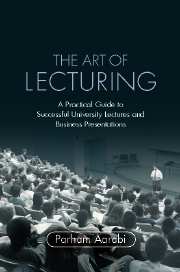Book contents
- Frontmatter
- Contents
- Preface
- 1 Introduction
- 2 The lecturing mindset
- 3 Old school basics
- 4 General lecturing principles
- 5 At the beginning of the lecture
- 6 Things you should be aware of during the lecture
- 7 Effective tools/tricks to energize your lecture
- 8 Common mistakes that turn good lectures into disasters
- 9 At the end of the lecture
- 10 The art of academic lecturing
- 11 Making lectures come to life through labs
- 12 Lecturing in non-academic contexts
- 13 The mechanics of professional presentations
- 14 Final words
- About the Author
- Index
8 - Common mistakes that turn good lectures into disasters
Published online by Cambridge University Press: 31 January 2011
- Frontmatter
- Contents
- Preface
- 1 Introduction
- 2 The lecturing mindset
- 3 Old school basics
- 4 General lecturing principles
- 5 At the beginning of the lecture
- 6 Things you should be aware of during the lecture
- 7 Effective tools/tricks to energize your lecture
- 8 Common mistakes that turn good lectures into disasters
- 9 At the end of the lecture
- 10 The art of academic lecturing
- 11 Making lectures come to life through labs
- 12 Lecturing in non-academic contexts
- 13 The mechanics of professional presentations
- 14 Final words
- About the Author
- Index
Summary
Now that we have discussed in detail what you should do in a lecture, it is equally important to remind the reader of some bad habits that can often make a lecture a disaster. These significant errors in lecturing decisions are actually quite common. There is a tendency in all of us to either pack too much into the lecture or to go too quickly through a topic which the audience does not understand. In the following sections, we will look at these common mistakes, and come up with solutions as well as a list of DON'Ts.
OVERCONFIDENCE DISGUISED AS ARROGANCE
Confidence is a great thing, especially when it comes to giving lectures. The line between proper confidence and overconfidence, however, can sometimes be blurred. It is essential to keep in mind that overconfidence is often seen as arrogance, resulting in a strained audience–lecturer connection and lack of belief and interest in the lecture. This is especially the case, I have noticed, for successful (or not so successful) lecturers who are at the beginning or towards the middle of their careers.
It is useful to note that lecturing is in part similar to being a politician. The audience must be engaged and satisfied with the lecture or else they will not give you their attention, just as they would not give their vote to a politician.
Information
- Type
- Chapter
- Information
- The Art of LecturingA Practical Guide to Successful University Lectures and Business Presentations, pp. 80 - 91Publisher: Cambridge University PressPrint publication year: 2007
